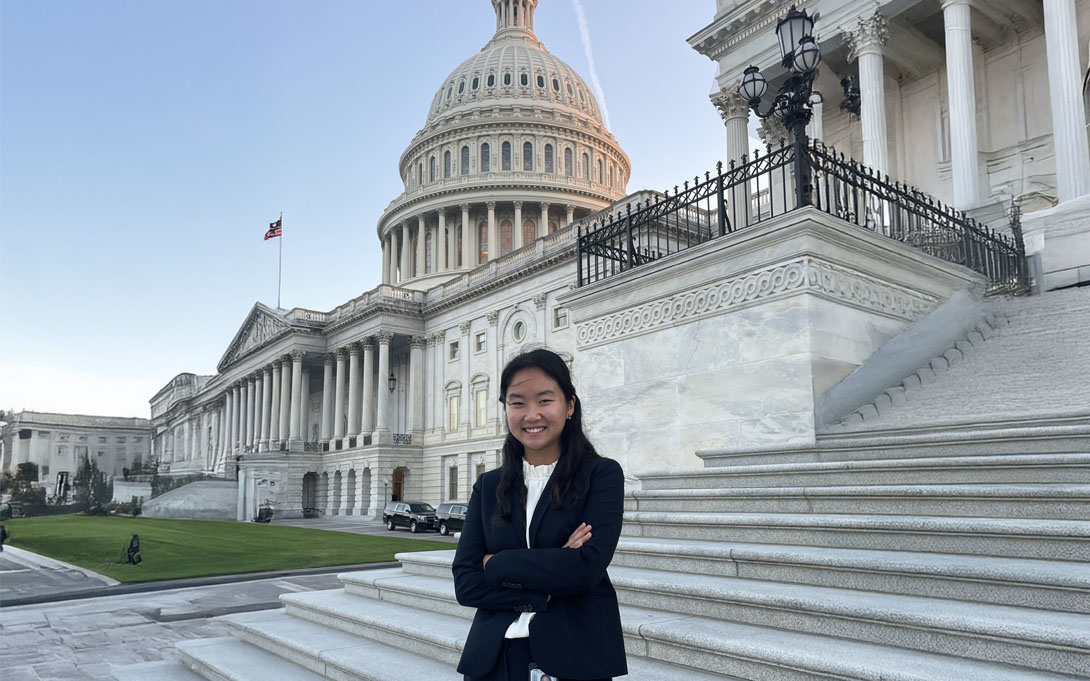
STPP recently reached out to our former student researcher Sujin Kim (BA Political Science '22) to ask her some questions about her current job with the US Senate. Her answers are edited for length.
Can you please give me an overview of your current role with the Senate Committee on Small Business and Entrepreneurship? How did you get this job?
I'm currently a Professional Staff Member for the committee. I actually started my time on the Hill in this office as a staff assistant in 2022, and worked up from there. I was very lucky and got the staff assistant job off the Senate employment bulletin.
2) What are the most interesting parts of your job? the most challenging?
The most interesting part of my job for me is learning the policy background on the issues I cover. So much happens in the Senate and on the hill that isn't written or recorded, and a lot of that behind-the-scenes work has defined major policy and norms over the years. Learning what really happened during major policy development in the past is so interesting. It's fun to revise my previous understanding of major events and helps me better understand how to pursue legislative goals in the present. The most challenging part for me is actually the same thing; it's being able to comprehend the sheer volume of information we need to know to make decisions. Since a lot of behind-the-scenes work isn't officially recorded, figuring out how things really happened is important and can be very challenging. Doing that research on top of learning the technical content of the issues we cover is a lot of reading and a lot of studying, and as a young staffer, I have a very small knowledge base compared to folks who have been here for years. Expanding that base is an important part of learning how to "do" policy, and for me, it's also the hardest part of my job.
How did your work with STPP add to your professional development and interests? What projects did you work on and/or writing did you do for STPP?
I was a program assistant and then an undergraduate researcher with STPP. Both of those roles played a big part in developing my career interests. As an assistant, one project in particular stands out to me; Professor Parthasarathy was going to testify on the Hill, before the House Committee on Science, Space, and Technology. I prepared some of her materials and researched the committee members to estimate what kinds of questions they might want to ask her based on their previous work. The first time I was responsible for preparing hearing questions, I knew how to make the judgement call on what questions the Senator might want to ask because of the prep I did for Professor Parthasarathy. That specific project stands out to me, but the broader skills I needed to do that well, the logical reasoning and critical thinking skills, were ones I used all the time at my STPP job in college. As a researcher, I worked on the 2022 Technology Assessment Project on biases in AI, specifically Large Language Models. In my current job, one of the issues I cover is AI and Tech. I had an extensive knowledge base on AI coming into this job, and it's given me a massive head start in understanding the issue and learning what policy goals to pursue in the area. The 2022 TAP project also taught me how to view issues critically, and identify bias and prejudice. It may be easy to understand that people of color are less likely to be approved for a loan than their white counterparts, but it is not easy to quickly understand the nuances of why that is. This is so important to consider when working in policy, and my time with the STPP program taught me that very foundational skill.
3) What advice do you have for undergrads interested in science and technology policy at U of M? What advice do you have for students interested in working for the federal government (or other public service jobs)?
My biggest piece of advice for undergrads who are interested in science and tech policy is to become a research assistant. Michigan is a top-tier R1 institution with some of the most innovative academics in their fields. I worked as a research assistant on several projects, and the opportunity you get to learn directly from people who are leading their fields is unmatched. You get to watch their process up close and see what they see. You learn how they process information, what kinds of patterns they look for, and how they ask questions. Learning how to ask effective questions is a big part of research, and of being in the workforce. It was not an intrinsic skill for me, and I learned how to do it by watching the professors and graduate students I worked for while in college. For students interested in working in public service, my advice is to reach out to your alumni network. DC specifically is full of Michigan alums. They're a wonderful resource for career advice, mentorship, and job searching. If I get a cold email from a Michigan student or alum, I will always say yes to getting coffee or reviewing their resume without exception. I know many other alumni do the same. Getting a job is hard no matter what, getting a job in public service and especially for the federal government can be even harder. We have all been there and will help, use us!
